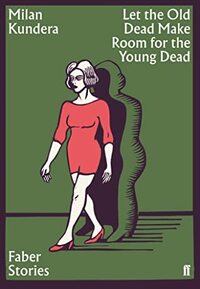Take a photo of a barcode or cover
reflective
medium-paced
Plot or Character Driven:
Character
Strong character development:
Yes
Loveable characters:
No
Diverse cast of characters:
N/A
Flaws of characters a main focus:
Yes
I don't think this has any spoilers, but it might be a little obvious what I'm talking about, so I've marked it so.
Kundera took a wonderful premise and a cool and beautiful pair of characters and did some sort of literary origami. But too few folds. It didn't end with me thinking he had uncovered something about humanity, but instead with the feeling that he'd played out some weird wishful thinking.
Perhaps he knew someone like this. But saying that, don't make the mistake of thinking he knew them, not how they thought or felt, just that someone in his life had escaped him in the same way as in the story. And he still desired them upon writing this.
I'm left thinking that his little stage play here undermined and desecrated the woman involved. If there wasn't a woman involved in real life, it desecrated the character at any rate. Which is a shame. She needed fleshing out. She needed to be more than a strange gelatinous mass shaped by the men around her. Read it and you'll understand. Choosing what she did was not reclaiming herself. Not her powerful younger self. It was capitulation to a man who never matured.
Maybe I'm meant to feel this way. But I hazard to guess, I wasn't. It is still capable of expressing its ideas about the old moving to make room for the new. About the hope that exists in never giving in to life's ebb. And that what is lost can be reclaimed, if it is desired. But it comes down to the method of retrieval. It comes down to your victory over something not costing someone else their autonomy.
I recommend this story is read. It is worth reading. It's a fantastic story that ends so wrongly that it might act as a good lesson for writers. It's a stillbirth. And I'm a little devastated. It got me thinking though and that's worth the stars. Even its failings can't outweigh its positives.
Kundera took a wonderful premise and a cool and beautiful pair of characters and did some sort of literary origami. But too few folds. It didn't end with me thinking he had uncovered something about humanity, but instead with the feeling that he'd played out some weird wishful thinking.
Perhaps he knew someone like this. But saying that, don't make the mistake of thinking he knew them, not how they thought or felt, just that someone in his life had escaped him in the same way as in the story. And he still desired them upon writing this.
I'm left thinking that his little stage play here undermined and desecrated the woman involved. If there wasn't a woman involved in real life, it desecrated the character at any rate. Which is a shame. She needed fleshing out. She needed to be more than a strange gelatinous mass shaped by the men around her. Read it and you'll understand. Choosing what she did was not reclaiming herself. Not her powerful younger self. It was capitulation to a man who never matured.
Maybe I'm meant to feel this way. But I hazard to guess, I wasn't. It is still capable of expressing its ideas about the old moving to make room for the new. About the hope that exists in never giving in to life's ebb. And that what is lost can be reclaimed, if it is desired. But it comes down to the method of retrieval. It comes down to your victory over something not costing someone else their autonomy.
I recommend this story is read. It is worth reading. It's a fantastic story that ends so wrongly that it might act as a good lesson for writers. It's a stillbirth. And I'm a little devastated. It got me thinking though and that's worth the stars. Even its failings can't outweigh its positives.
dark
emotional
reflective
sad
fast-paced
Plot or Character Driven:
Character
Strong character development:
Yes
Loveable characters:
Complicated
Diverse cast of characters:
No
Flaws of characters a main focus:
Yes
funny
hopeful
fast-paced
Plot or Character Driven:
Character
Strong character development:
Complicated
Loveable characters:
No
I read this in a couple of sittings in my living room and on the train down to the skatepark at Kozukue. It's short and deeply introspective and reminded me that short stories can often pack more punch than novels when it comes to the writing.
"At that time he had stood face-to-face with the unimaginable. Obviously he was experiencing that very short period (the paradisiac period) when the imagination is not yet satiated by experience, has not become routine, knows little, and knows how to do little, so that the unimaginable still exists; and should the unimaginable become reality (without the mediation of the imaginable, without that narrow bridge of images), a man will be seized by panic and vertigo."
"At that time he had stood face-to-face with the unimaginable. Obviously he was experiencing that very short period (the paradisiac period) when the imagination is not yet satiated by experience, has not become routine, knows little, and knows how to do little, so that the unimaginable still exists; and should the unimaginable become reality (without the mediation of the imaginable, without that narrow bridge of images), a man will be seized by panic and vertigo."
emotional
reflective
medium-paced
Plot or Character Driven:
Character
Strong character development:
Complicated
Loveable characters:
Yes
Diverse cast of characters:
N/A
Flaws of characters a main focus:
Yes
for some reason, this novel didn’t capture me the same way other short novels have, but it still provoked thoughts on the pathway between maturing and growing old.
“the idea that his mother could still have a sex life disgusted him: everything in her that remained sexual (at least in the realm of possibility and chance) disgusted him, and because the idea of sex is connected with the idea of youthfulness, he was disgusted by everything that was still youthful in her; he was no longer a child, and his mother's youthfulness (combined with the aggressiveness of her motherly care) disagreeably thwarted his relationship with girls, who had begun to interest him; he wanted to have an old mother; only from such a mother would he tolerate love, and it was only such a mother he was capable of loving. and although at times she realized that in this way he was pushing her toward the grave, she had finally submitted to him, succumbed to his pressure, and even idealized her capitulation, persuading herself that the beauty of her life consisted precisely in quietly fading out in the shadow of another life.”
“the idea that his mother could still have a sex life disgusted him: everything in her that remained sexual (at least in the realm of possibility and chance) disgusted him, and because the idea of sex is connected with the idea of youthfulness, he was disgusted by everything that was still youthful in her; he was no longer a child, and his mother's youthfulness (combined with the aggressiveness of her motherly care) disagreeably thwarted his relationship with girls, who had begun to interest him; he wanted to have an old mother; only from such a mother would he tolerate love, and it was only such a mother he was capable of loving. and although at times she realized that in this way he was pushing her toward the grave, she had finally submitted to him, succumbed to his pressure, and even idealized her capitulation, persuading herself that the beauty of her life consisted precisely in quietly fading out in the shadow of another life.”
"(...) if he then became disgusted with her and destroyed her monument in his thoughts, it made no difference because her monument was outside her, just as his thoughts and memory were outside her, and everything that was outside her made no difference."
"You shouldn't always return to the past. It's enough that we have to devote so much time to it against our will."
"You shouldn't always return to the past. It's enough that we have to devote so much time to it against our will."




